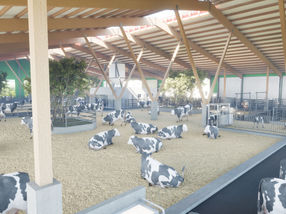Deformed Wing Virus: Honeybees Threatened by a More Virulent Virus
Researchers reveal geographic distribution of emerging viral variants
Advertisement
According to an international research group, a genetic variant of the deformed wing virus (DWV) is more dangerous to honeybees than the original virus strain. The consortium of researchers is based at Freie Universität Berlin and Martin Luther University Halle-Wittenberg. The emerging variant could represent a threat to honeybees worldwide and is probably already widespread in many parts of Europe. The findings were published in the recent edition of the international journal “Proceedings of the Royal Society B.”
Honeybees as pollinators are indispensable for the yield of many wild and cultivated flowering plants and for the preservation of biodiversity. Losses in honeybee populations are an on-going concern. Deformed wing virus (DWV), which causes crippled wings and is transmitted by varroa mites, is implicated as a major driver of colony decline.
DWV is composed of at least two unique genotypes, DWV-A and DWV-B. The team of researchers, including Prof. Dino McMahon at Freie Universität Berlin and the German Federal Institute for Materials Research and Testing and Prof. Robert Paxton at Martin Luther University in Halle, Germany, and the German Centre for Integrative Biodiversity Research (iDiv) were able to show the DWV-B is extremely virulent for the bees: it kills them faster than the traditional DWV-A. The researchers tested bees in Great Britain and Germany. A lot of them were infected with DWV-B.
The researchers stress the importance of identifying and characterizing the full diversity of pathogens thought to be responsible for disease. Prof. Dino McMahon, who co-led the research with Dr. Myrsini Natsopoulou, now at the University of Copenhagen, said, “Our findings are interesting because they show that one of the main culprits of honeybee decline – deformed wing virus transmitted by varroa mites – is in fact composed of different strains. Importantly, we have shown that an emerging variant of DWV, termed DWV-B, is more virulent than the globally established form of the virus, termed DWV-A.” Prof. Robert Paxton added, “Scientists have been searching for a cause or causes for the increased colony mortality that beekeepers have experienced over the past decade; the emergence of DWV-B in Europe may be just that cause.”
“Our study also reveals the geographic distribution of this virulent virus genotype in honeybees across Great Britain. This may help us understand regional differences in honey bee mortality,” said Professor Brown, of Royal Holloway University of London.
This study was funded by the Insect Pollinators Initiative, Great Britain, and iDiv.

































































